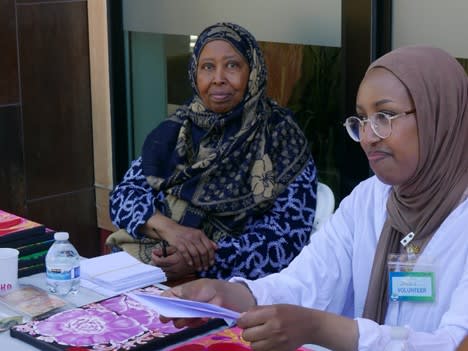
Providence Swedish has invested $45k in our partnership with Seattle's Somali Health Board and participates regularly in the organization's events, such as health fairs and seminars.
Every year, Providence Swedish provides millions of dollars in support to our partners who provide a broad spectrum of care and services in our local communities. Our partners include food banks, senior services organizations and organizations that support immigrants and their families as they make their new lives in the United States.
“These partnerships reflect our values of compassion, integrity and dignity,” says Senior Community Health Investment Program Manager Pinky Herrera. “Respecting individuals and working with them where they are is central to demonstrating our compassion and respect for every community and valuing their individual cultures.”
One such organization is the Somali Health Board (SHB). The non-profit was founded in 2012 to support King County’s growing Somali community. Over the years, Providence Swedish has invested $45k in our partnership with SHB and regularly participated in events such as health fairs and seminars. (The photo at the top was taken at SHB's July 2024 Health Fair.)
It’s estimated that King County is home to an estimated 30,000 Somali refugees who have settled in the United States after fleeing Somalia’s ongoing civil war. Initially SHB provided clients with referrals for basic issues, including housing, legal and financial services. Today, SHB is a large multi-service organization offering a host of resources and services to underserved communities throughout the county.
Central to SHB’s mission is its mental health program, which addresses the high rates of trauma and undiagnosed or untreated mental illness in the local Somali community. The program is a critical area of growth and is committed to stigma reduction and increasing access to services and programs tailored to the unique experience of Somali families.
“Several years ago, we had a number of suicides in our community, back-to-back. This was not normal in the Somali community,” says Fartun Mohammed, RN, Somali Senior Health Promotion (SSHP) Program Manager and Behavioral Health Program Manager at SHB. “We realized that we had to normalize talking about mental health and the stigma that goes around it. Our goal was to get the community together, so people start feeling comfortable talking about mental health and their personal needs before they get to the point of committing suicide.”
To help do this SHB offers mental health referrals, case management, community education and numerous support groups. Sessions are offered in person, virtually or hybrid, and conducted in English or Somali, depending on the participants. These programs are particularly beneficial for immigrant parents and their Americanized children, who often struggle to understand one another. The combination is often a source of conflict for families facing the pressures of work and daily life in the United States, says Sareda Abshir, a mental health case manager at SHB.
“Among new immigrants, there is a lot more [emotional] repression there than with people who've been here a decade or more. They understand that while life is a lot different here, there's a distinct set of challenges,” says Abshir. “For those who are newer, they are just learning the language and need more help with basic needs there than being ready for mental health help.”
“[When earlier generations arrived in the United States] they came looking for a safe place and to be able to feed their kids,” says Mohammed “They didn’t have time to process their trauma. They were escaping a civil war. Today they are still dealing with PTSD.”
“Now their kids are going through different struggles that maybe parents don’t have a lot of insight on and maybe don’t seem like such a big deal to them,” adds Abshir. “There’s a lack of understanding that is upsetting to both sides.”
“For example, we are seeing more young girls with eating disorders or body image issues. Their parents just can’t comprehend that. It’s not something they grew up with.” says Mohammed.
Both Mohammed and Abshir affirm that Community Benefit support is vital to outreach efforts including the production of literature and building SHB’s social media presence, so more people can identify issues and find the right resources to help themselves and their families.
“We are trying to meet our younger people where they are at,” says Abshir.
“Partnering with organizations like SHB is vital. One of the health care priorities voiced by the community is more culturally competent mental healthcare providers,” says Herrera. “Providence Swedish’s health equity work shows our commitment – as seen with our Cultural Navigators, for example, to making connections with BIPOC communities to align with programs, resources and services that address mental health in meaningful and effective ways.”
About Providence Swedish
Providence Swedish has served the Puget Sound region since the first Providence hospital opened in Seattle in 1877 and the first Swedish hospital opened in 1910. The two organizations affiliated in 2012 and today comprise the largest health care delivery system in Western Washington, with 22,000 caregivers, eight hospitals and 244 clinics throughout Western Washington – from Everett to Centralia. A not-for-profit family of organizations, Providence Swedish provides more than $545 million in community benefit in the Puget Sound region each year. The health system offers a comprehensive range of services and specialty and subspecialty care in a number of clinical areas, including cancer, cardiovascular health, neurosciences, orthopedics, digestive health and women’s and children’s care.
About the Author
More Content by Swedish Community Relations Team






















